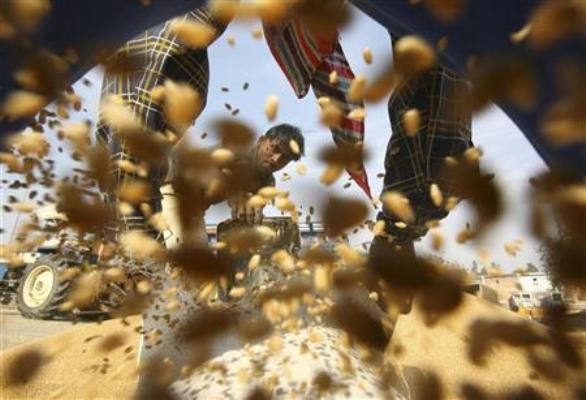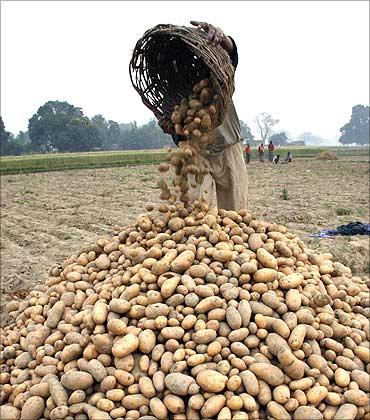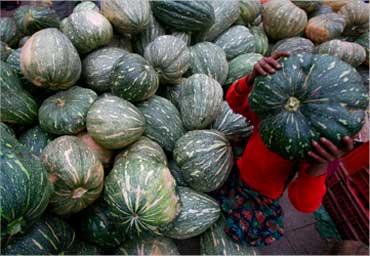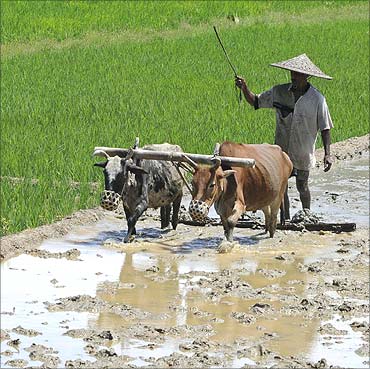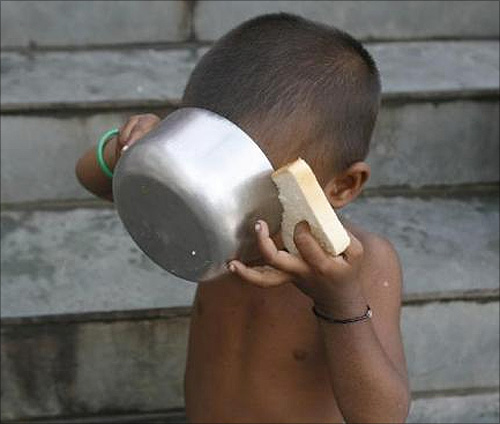 | « Back to article | Print this article |
The real moral failure in the food security Bill debate
A widening food entitlement under the notoriously leaky public distribution system, rather than through direct cash transfers, is self-evidently a giant step backward in rationalising the provision of public goods and services to the poor and disadvantaged.
Recently, Economics Nobel laureate Amartya Sen blamed the Opposition Bharatiya Janata Party for stalling the National Food Security Bill by disrupting proceedings in Parliament.
Not passing the Bill, Sen argued, would be 'immoral'.
Sen's views on an entitlement-based development agenda are well known, and his support for the food security Bill on ethical grounds is entirely consistent with his overall ideological position, which remains closer to the socialism of the Licence Raj than it does to the pro-market ethos that has emerged in India since 1991.
Click NEXT to read further. . .
The real moral failure in the food security Bill debate
Likewise, the support of the left parties for the economics of entitlement is entirely logically consistent, whether one agrees with it or not.
Rather, what is completely incoherent and smacks of the worst form of political opportunism is the BJP's support for the Bill.
Together with its opposition to opening up foreign direct investment in multi-brand retail, the principal Opposition has shown itself to be as unprincipled as the government of the day, which cynically rationalises a burgeoning and fiscally ruinous raft of entitlement programmes that it hopes will be vote-winners, under the aegis of 'inclusive development'.
Click NEXT to read further. . .
The real moral failure in the food security Bill debate
While, at a stretch, one could make a nuanced argument against opening up FDI in retail as a distraction from much more vitally needed and deeper structural reforms of the economy, no such defence exists for supporting an expansion of the provision of subsidised food through the inefficient and corruption-prone public distribution system.
A widening food entitlement under the notoriously leaky public distribution system, rather than through direct cash transfers, is self-evidently a giant step backward in rationalising the provision of public goods and services to the poor and disadvantaged.
Click NEXT to read further. . .
The real moral failure in the food security Bill debate
While it is indeed a moral imperative for a society to feed its people, the true immorality is in promising food through a mechanism that is known to be deficient and will fail to deliver it.
More to the point, the notion of increasing access to nutrition through a legislative, entitlement-based approach harks back to the top-down, centrally planned development model that we supposedly jettisoned after 1991.
While it is hardly a surprise that the Congress favours such an approach -- how genuine is its commitment to liberal economic policies has always been in doubt -- what is most disappointing is the BJP's failure to take a principled position that would mark it out as a genuine, centre-right, pro-market alternative to the Congress.
Click NEXT to read further. . .
The real moral failure in the food security Bill debate
Instead, by holding the food security Bill hostage to unrelated demands having to do with the coal and rail scams, they appear utterly opportunistic and ideologically incoherent.
What no one in the ranks of the BJP and few among whatever centre-right intelligentsia exists in India has had the courage to do is to challenge frontally the logic that genuine 'food security' is delivered through legislation.
Rather, food insecurity is a manifestation of poverty and low-income levels, and can only genuinely be eliminated by tackling the underlying roots of poverty and deprivation.
And what 20 years of economic liberalisation in India, and the experience of countless other developed and emerging economies has taught us, is that a meaningful long-run strategy of eradicating poverty must be grounded in an economic policy that promotes, rather than retards, economic growth.
Click NEXT to read further. . .
The real moral failure in the food security Bill debate
While more rapid growth does not automatically guarantee reduced poverty or increased food security in any mechanical fashion, what economic history and contemporary evidence clearly establish is that anti-growth policies are also anti-poor policies.
Ironically, the Chinese Communists understand the truth of this proposition far better than our home-grown Communists and thinkers on the left.
China's great economic reformer Deng Xiaoping put it pithily when he argued that he could either redistribute poverty or he could redistribute wealth.
Click NEXT to read further. . .
The real moral failure in the food security Bill debate
The economic miracle that Deng unleashed in China, even with all of its attendant environmental and social problems, has nonetheless done more to reduce poverty and increase food security in China than the decades of Maoist-style central planning that preceded it.
Supporting the food security Bill on (supposedly) ethical grounds does not require careful argumentation, and buys you the moral high ground to boot.
Articulating a nuanced case that the food security Bill, by bloating fiscal expenditure, swelling an already dysfunctional PDS, and taking our attention away from much-needed structural economic reforms that are necessary to boost growth, will actually do more harm than good to its intended beneficiaries requires an exercise of statesmanship and a vision for the future that go beyond a 30-second sound bite or a 140-character tweet.
Where, then, does the real moral failure lie?
The writer is an economics professor at Carleton University in Ottawa, Canada, and co-author of Indianomix: Making Sense of Modern India (Random House India, 2012)
